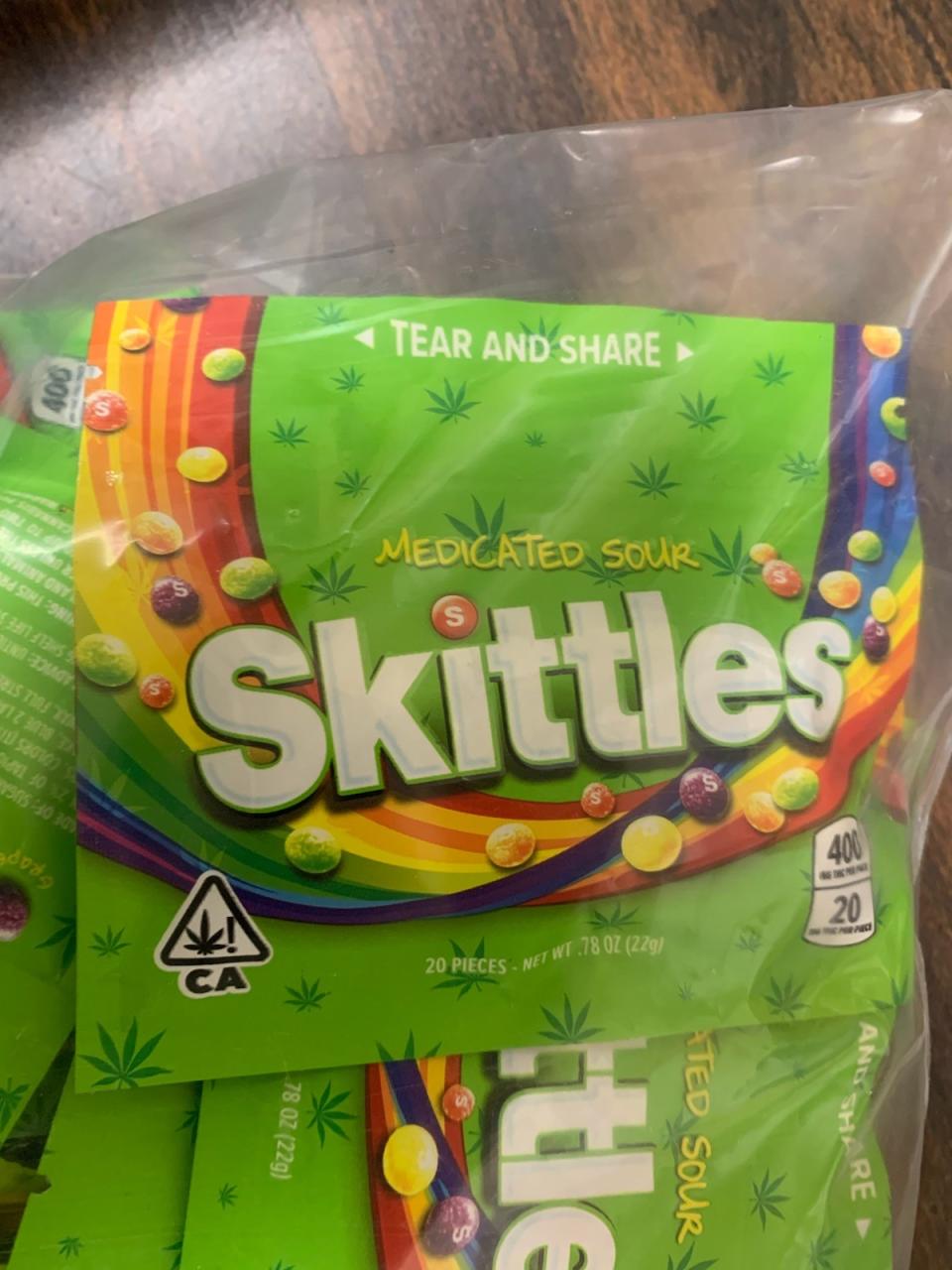Beware of marijuana edibles in your kids' Halloween stash, police warn: 'Not everything is as it seems'
Adding to legendary Halloween fears about razor blades in apples and poison-laced Pixie Stix comes a warning this year from police about marijuana edibles that bear a striking resemblance to ordinary candy.
The Indiana State Police issued the warning on Facebook earlier this week, alongside photos of “medicated” Skittles and Starburst Gummies, which contain THC, the psychoactive compound of cannabis.
“Parents, here is an example of what to look for in your child's Halloween candy this year,” the post reads. “These were seized just this past weekend by one of our Troopers from the Lowell post. While they are packaged and marketed to look like candy, they are not. You have to look closely to see the ‘Medicated’ wording. Please thoroughly check all candy and don't assume it's ‘OK’ just because it looks ‘OK.’ #safehalloween #trickortreat”

This red flag isn’t unique to Indiana. Police in Connecticut issued a warning to parents last year after reports that two children were given THC edibles while trick-or-treating. Police in Denver have also warned parents to check their children’s Halloween candy stash for edibles.
While it’s certainly unlikely that anyone would knowingly dole out their personal cannabis-candy stash to children — if kids even trick-or-treat at all this year, due to pandemic precautions — the packaging can be confusing, leading to accidental mixups, Capt. Ron Galaviz, chief public information officer at the Indiana State Police, tells Yahoo Life. The recently confiscated gummies and Skittles prompted the department to issue a separate warning on edibles this year, beyond its typical Halloween safety warning.
Indiana is bordered by states where marijuana is legalized, which Galaviz says may increase the odds of medicated edibles surfacing on Halloween. “Just take an extra moment to inspect your child’s candy, maybe more than you normally would,” he says. “Not everything is as it seems.”

Dr. Kevin Osterhoudt, medical director of the Poison Control Center at Children’s Hospital of Philadelphia, tells Yahoo Life: "Marijuana edibles are legal in some states and illegal in others, but they’ve made their way all across the country." Because of that, he suggests, "Don’t let your children eat any collected cookies, brownies, or gummy candies that aren’t in original store wrapping."
Unfortunately, children can and do accidentally ingest edibles. In 2017, California’s poison control centers received 588 calls regarding people under 19, with more than 250 of those calls involving children 5 and under. Nationally, the trend has been similar, with calls to poison control centers more than doubling in Massachusetts after legalization and Maryland Poison Control reporting a 30 percent hike in calls, according to U.S. News and World Report.
Dr. Alexandra Funk, director of the Central Ohio Poison Center at Nationwide Children’s Hospital, tells Yahoo Life that it’s especially concerning when children eat marijuana edibles. “These have extreme high amounts of THC concentration in them,” she says. For example, one piece of medicated Starburst gummies contains 68 milligrams of THC, while “it’s usually suggested that someone takes 10 milligrams maximum as a starting dose,” Funk says.
The packaging is also confusing, raising the risk that children could tear into them. “These products look strikingly and scarily close to non-THC candies,” Funk says.
When children do eat them, it’s a medical emergency, according to Dr. Trish Garcia, a hospitalist and pediatrician at Connecticut Children’s. She recommends calling Poison Control if you think your child has eaten an edible, and then taking your child to the emergency room.
“It's a really scary situation, and having someone walk you through what you should bring with you and how to read the label is really helpful so you can give the doctors accurate information,” Garcia says. “Poison Control will also help the doctors take care of the child so it's helpful to loop them in early.” But, she adds, if your child is in “severe distress,” call 911 instead.
Children can experience a variety of symptoms after eating an edible, depending on their size and how much they ingested, Jamie Alan, an assistant professor of pharmacology and toxicology at Michigan State University, tells Yahoo Life. “There is a range of symptoms, from loss of coordination and being unbalanced to sleepiness to trouble breathing,” she says. “In severe cases, children can become unconscious and need ventilator support.”
Doctors can offer treatments, including IV medication for low blood sugar, medication to help with agitation, and a low-stimulation environment, Garcia says. “Children will be watched in the hospital,” she says. “The amount of time depends on the amount of THC ingested, how the child is doing, and the child's age, all of which will effect how long the intoxication will last.”
However, “treatment is mostly supportive,” Dr. Gina Song, a pediatrician at Northwestern Medicine Delnor Hospital, tells Yahoo Life. That usually ends up being along the lines of “careful monitoring and treating the symptoms when they occur,” she says.
Alan warns that it can take time after a child eats an edible to show the effects, noting, “The onset [of symptoms] will be delayed, and the subsequent intoxication will be longer.”
Garcia recommends being aware that this can happen, especially if you live in an area with looser marijuana laws. “If a child is acting funny, parents should think about this as a potential cause and seek care immediately,” she says.
Galaviz urges parents to inspect their child’s Halloween candy, just in case. “Check it twice,” he says.
“Usually, they will have the word ‘medicated’ on the label, but you have to look for it,” Funk says.
Read more from Yahoo Life
Family builds 'Hogwarts Castle' in front yard to lift neighborhood's spirits during Halloween
Halloween tips and ideas to safely celebrate during the coronavirus pandemic
Want lifestyle and wellness news delivered to your inbox? Sign up here for Yahoo Life’s newsletter.


